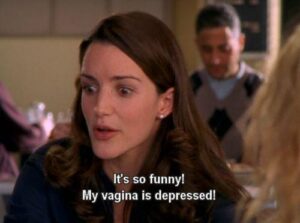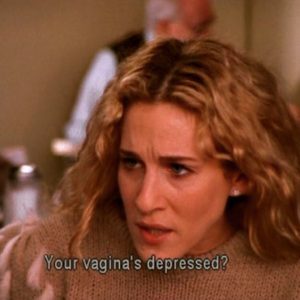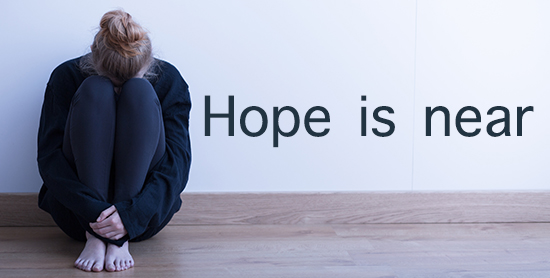
When we think of celebrities we don’t think of celebrities with Vulvodynia. We think of glamour, luxury, and fame, but celebrities are human beings too. They can fall sick, experience chronic pain, and have terminal illnesses. Sadly, sometimes the only time we hear a public figure had a severe illness, is when they pass away like it was the case of celebrity Chadwick Boseman who battled cancer in silence for four years. While there are many reasons why they may choose not to share it publicly, it is important to know that we are not alone in any battle, whether we know it or not. While it is to be respected that they want to have their privacy, I think that when they have the occasion to speak on what they are going through, it really helps normalize health and mental health challenges.
I am sure that more than one well-known celebrity suffers from Vulvodynia, though I have only found one in my research, however, we are still on the way to not only normalizing speaking about pain, but especially in an area that can be so difficult to discuss publicly.
We Need To Normalize Talking About Vulvodynia
 I think we are headed in the right direction in normalizing speaking about it though, as some public figures are using their voice to bring awareness to some health conditions. Lady Gaga has brought a lot of visibility to chronic pain through sharing her own struggle with fibromyalgia, while other actors have spoken on it, she is shedding much more light on it than anyone did before by showing the ups and downs of her fight. We have also heard about Selena Gomez’s battle with lupus, including needing a kidney transplant. When they speak about conditions that aren’t that well-known or that have a lot of stigma around it, they are helping other sufferers be more understood. Of course, sometimes using their platform is not always possible, when you struggle with your health, you need to tend to yourself first, but I for one appreciate when in better times, they open up about it and pave the way for others to talk about it.
I think we are headed in the right direction in normalizing speaking about it though, as some public figures are using their voice to bring awareness to some health conditions. Lady Gaga has brought a lot of visibility to chronic pain through sharing her own struggle with fibromyalgia, while other actors have spoken on it, she is shedding much more light on it than anyone did before by showing the ups and downs of her fight. We have also heard about Selena Gomez’s battle with lupus, including needing a kidney transplant. When they speak about conditions that aren’t that well-known or that have a lot of stigma around it, they are helping other sufferers be more understood. Of course, sometimes using their platform is not always possible, when you struggle with your health, you need to tend to yourself first, but I for one appreciate when in better times, they open up about it and pave the way for others to talk about it.
While Vulvodynia has an extra stigma to it due to the body part affected, the actress Zosia Mamet spoke about her experience with Pelvic Floor Pain Dysfunction and visits to a variety of doctors in her monologue in 2017. She describes the level of discouragement she experienced trying to find answers for her vulvar pain, how she was led to believe it was all in her head, and explains some treatments that were offered to her that seem more of a medieval torture than a cure for such a sensitive area. Her description of the difficulties women encounter to be taken seriously and to find a diagnosis is painfully accurate for something that is meant to be funny (as it’s stand-up comedy), but a great way to start a conversation on this and educate people on what the average woman with pelvic pain goes through.


On the other hand, Vulvodynia was presented as a “depressed vagina” in Sex and The City, when Charlotte reports her symptoms to a gynecologist, but the reality on how they presented it couldn’t be further from the truth, which brings the wrong type of attention to this painful condition. The idea that a course of anti-depressants can cure this and that it is not a debilitating condition seems truly invalidating to the number of Vulvodynia sufferers who had to change their whole lifestyle due to the excruciating pain.
While they say that no attention is bad since at least the name “Vulvodynia” is being put out there, I find it would be useful to portray it how it actually is, so when we speak about it, we don’t get told we are exaggerating. You have probably had your very own first-hand experience being told that it can’t be that bad and that you just need to relax, it is very hard for people who do not suffer from it, to relate to this – or any – pain. This puts us in situations that are even more traumatizing (in case that living in chronic pain and the psycho-emotional causes that play a role in it weren’t enough!).
Now, we know that most likely, not even people in our circle are likely to go and read about this condition, but when people in the public eye speak about it, they are being educated through that. Yes, a lot of the people in our lives may learn more about a certain condition through a celebrity speaking about their own struggle, than by just seeing you suffering with it. People with influence can move masses and know how to speak to convey their message, whereas we are just left in pain and only trying to come up with more and more metaphors to share with those around us for them to empathize with what we’re feeling (so many of us had to come up with things like: feeling someone poured acid on the vulva, having an open wound, having a candent metal rod poking that area… to try for others to understand what it feels like). Unfortunately, many times they still won’t understand no matter how well we try to explain.
My Personal Story Of Trauma And Public Humiliation
Something that happened to me in university was that during a class we had a debate. While I enjoyed classes, participating, and debating, in this particular case we had a very limited amount of time to expose our arguments, which made me quite stressed out. That stress caused a bad flare. On top of that, I had my period. There was no way for me to sit straight due to pain, and I was tilting my body towards the side, in a very odd-looking hunch. I was feeling self-conscious and I didn’t want anyone – my classmates or the professor – to take that body position as a signal of lack of interest. For that reason, when it was my turn to intervene, I apologized for holding a weird body posture and briefly mentioned my “ovaries” were really hurting (thank God I didn’t say “vulva”! You’ll see later why). I thought that would be enough for them to understand the situation and I carried on with my argument for the debate.
I didn’t think too much about it after the class, and I went on with my day, only to find out that in our next class I would be pretty much publicly stoned. The professor brought up the subject that I said the word “ovaries” in public and how that wasn’t professional (oh the irony that now I openly speak about vulvas and vaginas as part of my profession :D), and she was presenting that to my classmates expecting their nods of agreement. All of them except for one girl went on to agree and discuss how horrible it is for me to say that. They kept talking about me as if I wasn’t there, and I felt extremely humiliated. I started to cry and I tried to explain my pelvic floor problem (wishing for this terminology not to offend them), and even though I did the best I could to explain the level of pain I was feeling during the debate, and at that moment in the class, not a single person cared about it. They only cared about what they thought to be “proper” words to say, and “improper” words. As if “ovaries” was a curse word and not a part of the female anatomy. Maybe I could have worded it better, but to me saying “period” or something like that, felt “worse” than saying a body part. I didn’t want to paint an image of something bloody for them. Maybe I could’ve skipped altogether saying anything, but I do not think explaining our pain is a bad thing at all. However, for them it was.
View this post on Instagram
Then, feeling attacked and crying in the class, I went to the bathroom to continue sobbing and holding myself, filled with hatred for people who instead of meeting me with care and empathy (and let’s remember they were in college for psychology just like me, you’d think empathy is a thing among them), just looked down on me. When I needed people the most, it’s when they turned their backs against me. I felt lonely, isolated, misunderstood, and in a lot of pain. Only one classmate dared to defend me saying she didn’t find it improper. And in the corridor, walking back from the bathroom, I found another girl who cared about what was going on when she saw me unwell. She listened and understood, and it was the only bit of hope I had at that moment. But the numbers were against me, the majority didn’t care AT ALL about how I was feeling, they were just getting off humiliating me, and sadly the professor had a major role in it. Yes, a psychologist preferred what she considered to be politically correct rather than understanding where I was coming from and helping me feel cared for in the middle of my despair.
I failed tremendously to convey to these people, and to others in my life, how horrible and despairing living with Vulvodynia – or any chronic illness – is. How do I wish that in that time, I could’ve played for them Zosia Mamet’s monologue so maybe they would’ve listened and understood it better coming from someone public. It’s like when a celebrity goes through it, it is more real than when it’s someone they know is going through it. They will many more times pity someone famous than offer to help someone they know going through the same thing.
My Solution To Changing The Way We Talk About Vulvodynia
 Now, I am sure that this is not the case for everyone, and that there will be sufferers with a supportive family, friends, and close circles who care to listen to them and do their best to understand. That’s great and extremely helpful in the healing journey, however, it is not the norm. I had a few people close to me do their best to understand me, but not the majority. Most of us get tired of even speaking about it, even when we are unable to walk or do many other things because the pain is too strong. We give up because we know people won’t get it. They won’t care, it will be lost time and energy. So many times I’ve been mocked for my clothing choices and other things by my own family, not realizing I wasn’t able to wear any sort of pants or panties because the pain was excruciating. So I just sat with the hope that one day they would understand. I would never wish ill onto anyone, but sometimes I did wish that the people around me could experience my pain even if it was just for a few days. Just for them to understand what I was going through day in and day out.
Now, I am sure that this is not the case for everyone, and that there will be sufferers with a supportive family, friends, and close circles who care to listen to them and do their best to understand. That’s great and extremely helpful in the healing journey, however, it is not the norm. I had a few people close to me do their best to understand me, but not the majority. Most of us get tired of even speaking about it, even when we are unable to walk or do many other things because the pain is too strong. We give up because we know people won’t get it. They won’t care, it will be lost time and energy. So many times I’ve been mocked for my clothing choices and other things by my own family, not realizing I wasn’t able to wear any sort of pants or panties because the pain was excruciating. So I just sat with the hope that one day they would understand. I would never wish ill onto anyone, but sometimes I did wish that the people around me could experience my pain even if it was just for a few days. Just for them to understand what I was going through day in and day out.
Now I don’t need to have that fight with them anymore, I don’t need to wear skirts all year round, I don’t need to cry going to stores because there’s nothing that I can wear that will be warm enough, but I still see daily women who are misunderstood in their pain and it breaks my heart because I know so well the feeling of being isolated from others when nobody in your circle truly knows what it feels like.
For this reason, I speak about vulvas, vaginas, pain, and Vulvodynia as much as I like. Now that I have the strength, I will advocate for those who are going through it for them to be heard. But I cannot do it alone, and for this reason, I hope that soon more and more people – especially those with bigger platforms – will bring visibility to it. So every person living with this debilitating condition can be understood and taken seriously.
“Now that I have the strength, I will advocate for those who are going through it for them to be heard.”
You’re not alone in this fight, there are many women experiencing what you’re going through, and we hear you, understand you, and care for you.
I know how it feels and that’s why I decided to specialize in this, so I could bring the solutions that we aren’t often offered. There is hope, and if you’d like to know more about it, I would love for us to connect in a call.
Much love,
Miriam 🧡


 Complete this form to send me a message. Everything submitted through this form is fully confidential and I will reach back out to you promptly.
Complete this form to send me a message. Everything submitted through this form is fully confidential and I will reach back out to you promptly.